Watch Our Most Recent Workshop!
Visit our YouTube channel to access recorded sessions from our past workshops.
Past Workshops
-
Fall 2023
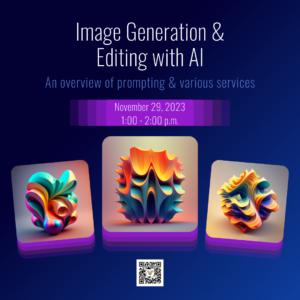 Image Generation and Editing With AI
Image Generation and Editing With AINovember 29, 1:00 – 2:00 PM (Virtual)
Unlock the future of visual content with Generative AI in our upcoming workshop on Image Generation and Editing. Dive into cutting-edge techniques for creating and enhancing visuals with unparalleled precision. Whether you’re an artist or just curious about the AI-driven visual realm, join us for hands-on sessions and demonstrations that will enhance your understanding of imagery.
Audience: Students, Faculty, & Staff
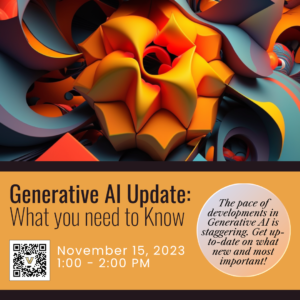 Generative AI Update: What You Need to Know
Generative AI Update: What You Need to KnowNovember 15, 1:00 – 2:00 PM (Virtual)
The pace of developments in Generative AI is staggering. Get up-to-date on what new and most important!
Audience: Students, Faculty, & Staff
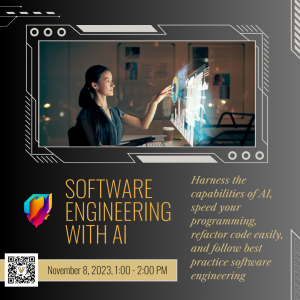 Software Engineering With AI
Software Engineering With AINovember 8, 1:00 – 2:00 PM (Virtual)
Programming and software engineering has been revolutionized with the advent of generative AI and tools such as Code Interpreter. Learn how to harness capabilities, speed your programming, refactor code easily, and follow best practice software engineering.
Audience: Students, Faculty, & Staff
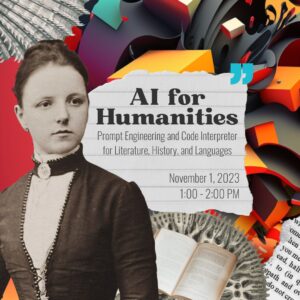 AI for Humanities: Prompt Engineering and Code Interpreter for Literature, History, and Languages
AI for Humanities: Prompt Engineering and Code Interpreter for Literature, History, and LanguagesNovember 1, 1:00 – 2:00 PM (Virtual)
The humanities, often seen as the bastion of human intuition and interpretation, are undergoing a renaissance with the integration of AI. This workshop delves into the potential of ChatGPT and prompt engineering in enhancing our understanding of literature, history, and languages. Participants will learn how to harness AI for textual analysis, historical data interpretation, and linguistic studies. We’ll showcase how prompt engineering can be tailored to answer intricate questions about literary themes, historical events, and language patterns. Join us to explore the convergence of AI and the humanities, and witness the dawn of a new era in humanistic studies.
Audience: Students, Faculty, & Staff
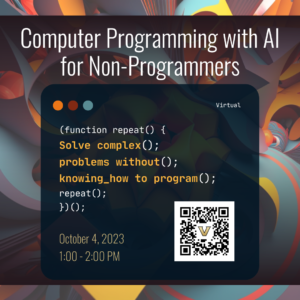 Computer Programming With AI for Non-programmers
Computer Programming With AI for Non-programmersOctober 4, 1:00 – 2:00 PM (Virtual)
Generative AI allows you to solve complex problems that requiring computer programming–without you having to know how to program! Learn how to tackle problems using generative AI and Code Interpreter in this interactive session.
Audience: Students, Faculty, and Staff
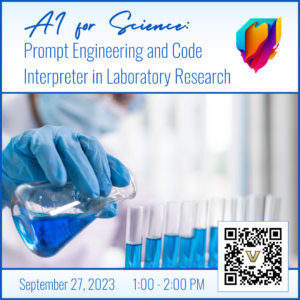 AI for Science: Prompt Engineering and Code Interpreter in Laboratory Research
AI for Science: Prompt Engineering and Code Interpreter in Laboratory ResearchSeptember 27, 1:00 – 2:00 PM (Virtual)
The frontier of scientific research is expanding rapidly with the integration of advanced AI tools like ChatGPT. This workshop is designed to introduce researchers to the transformative potential of prompt engineering and advanced data analytics in their scientific endeavors. Dive deep into methodologies that allow for intricate data interpretation, hypothesis testing, and pattern recognition. Learn how ChatGPT can be harnessed to analyze complex datasets, simulate scenarios, and even assist in experimental designs.
Audience: Students, Faculty, and Staff
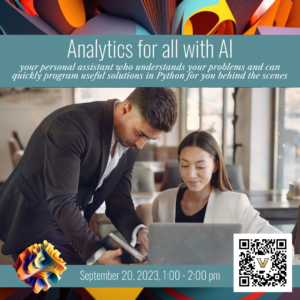 Analytics for All With AI
Analytics for All With AISeptember 20, 1:00 – 2:00 PM (Virtual)
Generative AI is a revolutionary tool–Code interpreters supercharges it, allowing the AI to build tools for you on the fly to solve complex problems. Think of it as your personal assistant who understands your problems, and can quickly program useful solutions in Python for you behind the scenes to provide accurate answers in a reproducible way that can be validated.
Audience: Students, Faculty, and Staff
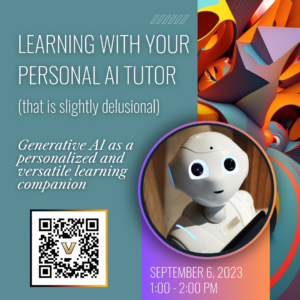 Learning With Your Personal AI Tutor (That Is Slightly Delusional)
Learning With Your Personal AI Tutor (That Is Slightly Delusional)September 6, 1:00 PM – 2:00 PM (Virtual)
One of the best uses of Generative AI is as a learning tool. Imagine having a tutor who knows what your background is, and will patiently explain concepts to you in any way you like–for example, using concrete examples or analogies; can whip up quizzes based on your study materials to help you self-test; can assess and make suggestions for your writing; can review your PowerPoint presentations, and suggest what tough questions you’ll face… We’ll cover the prompts, approaches, and tools that unlock these capabilities and more.
Audience: Students, Faculty, and Staff
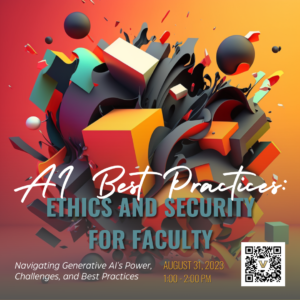 AI Best Practices: Ethics and Security for Faculty
AI Best Practices: Ethics and Security for FacultyAugust 31, 1:00 PM – 2:00 PM (Virtual)
Generative AI provides powerful tools that no previous generation has ever had. It also poses challenging ethical, security, and legal problems. We’ll cover best practices, and discuss the implications of using and misusing generative AI.
Audience: Faculty and Staff
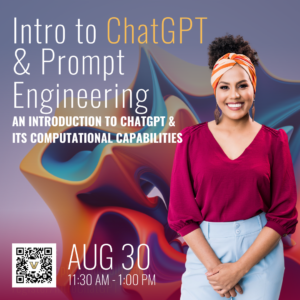 Introduction to ChatGPT and Prompt Engineering
Introduction to ChatGPT and Prompt EngineeringAugust 30, 11:30 Am – 1:00 PM (Virtual)
This workshop will introduce faculty to ChatGPT and its computational capabilities that can be used in teaching, research, and personal productivity. The workshop will provide an initial overview of “prompt engineering”, which is the discipline of crafting the statements, called prompts, that are sent to ChatGPT. Approximately half the time will be allocated to presentation and the other half to interactive discussion and examples.
Audience: Faculty
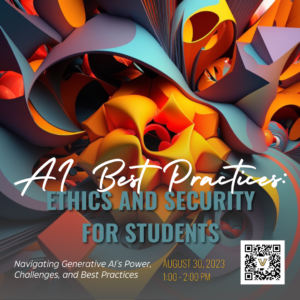 AI Best Practices: Ethics and Security for Students
AI Best Practices: Ethics and Security for StudentsAugust 30, 1:00 – 2:00 PM (Virtual)
Generative AI provides powerful tools that no previous generation has ever had. It also poses challenging ethical, security, and legal problems. We’ll cover best practices, and discuss the implications of using and misusing generative AI.
Audience: Graduate and Undergraduate Students
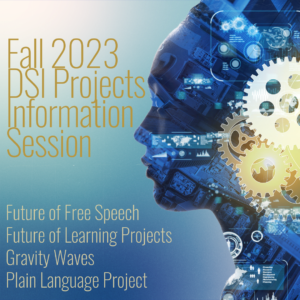 Fall 2023 Data Science Projects Information Session
Fall 2023 Data Science Projects Information SessionAugust 28, 1:00 – 2:00 PM (Virtual)
The Vanderbilt Data Science Team will be looking for undergraduate and graduate students to join us as team members on projects in the Fall semester. Learn about upcoming projects including:
- Future of Free Speech
- Future of Learning
- Gravity Waves
- Plain Language Project
We hope to see you at the virtual information session, which will be held on August 28th from 1:00 – 2:00 pm, to learn about these fall semester projects!
Audience: Graduate and Undergraduate Students
-
Summer 2023
 ChatGPT and the Future of Education Workshop
ChatGPT and the Future of Education WorkshopAugust 2, 11:30 Am – 1:00 PM (Virtual)
This workshop will explore the educational impacts of ChatGPT and its computational capabilities. A significant emphasis will be placed on understanding: 1) how to design assignments that account for ChatGPT, 2) innovative ways of using ChatGPT for teaching, and 3) communicating about appropriate usage with students. Approximately half the time will be allocated to presentation and the other half to interactive discussion and examples.
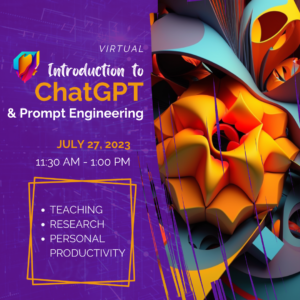 Introduction to ChatGPT & Prompt Engineering Workshop
Introduction to ChatGPT & Prompt Engineering WorkshopJuly 27, 11:30 Am – 1:00 PM (Virtual)
This workshop will introduce faculty to ChatGPT and its computational capabilities, which can be used in teaching, research, and personal productivity. The workshop will provide an initial overview of “prompt engineering”, which is the discipline of crafting the statements, called prompts, that are sent to ChatGPT. Approximately half the time will be allocated to presentation and the other half to interactive discussion and examples.
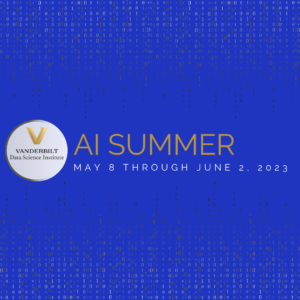 AI Summer Optional Workshop
AI Summer Optional WorkshopMay 22, Monday/Wednesday/Friday, 9:00 Am – 12:00 PM
Vanderbilt Data Science hosted an optional workshop on May 22 for our AI Summer participants in which we discussed the algorithms and architectures that make transformer models possible.
During the workshop, the Data Science Team discusses the influential paper “Formal Algorithms for Transformers” by Mary Phuong and Marcus Hutter. You can access the paper here. We recommend reading through the paper, paying particular attention to the introductory sections. Some notation may be unfamiliar, but you can leverage the power of ChatGPT, GPT4, BingChat, Claude, or Bard to help explain any complex concepts that may arise.
You can watch the workshop here.
 AI Summer (Virtual)
AI Summer (Virtual)May 8 to June 2, Monday/Wednesday/Friday, 9:00 Am – 12:00 PM
Vanderbilt Data Science’s AI Summer workshop, from May 8 to June 2, is a free course designed to help researchers, educators, and students gain a deep understanding of the latest AI technologies and techniques, specifically deep learning and transformers, and how they can be used to solve a variety of problems.
The four-week workshop will be virtual on Zoom, and it will include both theoretical and practical sessions. The course will start with a week-long focus on Python for Transformers, followed by a more in-depth AI Deep Dive in the second and third weeks. The workshop has limited capacity, and priority will be given to researchers and educators who have a research goal in mind, as well as students who are interested in joining the researchers and educators on projects that arise from these workshops.
Registration for this workshop is closed. You can view the playlist of each of our AI Summer workshops on our YouTube page.
-
Spring 2023
Using ChatGPT Through Prompt Engineering (Virtual)
Wednesday, March 22, 4:00 – 5:00 PM
ChatGPT and other AI models mark a groundbreaking step forward in artificial intelligence. These tools can be a valuable tool for your teaching and research, if you can master how to use them with Prompt Engineering. Vanderbilt Data Science is hosting a hands-on workshop on how to work with these models, and the types of prompts you can use solve problems and build solutions in you teaching and research.
You can view the workshop on our YouTube page.
Understanding Text-To-Image Models Workshop (Virtual)
Monday, February 27
Stable diffusion models have been shown to have incredible success generating realistic images. Models like DALL-E have shown the power to generate brand-new photo-realistic scenes, in addition to mimicking and transferring an art style onto existing photos. These models can be used in a variety of ways and experimentation with them can be easy. However, getting the image you’re looking for requires a careful selection of the input prompt and an understanding of the parameters of stable diffusion models.
Vanderbilt Data Science is offering a chance to go in-depth on prompt engineering at a workshop open to the Vanderbilt community. Understanding Text-to-Image Models: Dall-E, Stable Diffusion, and more will be held from noon to 1p.m. on February 27.
You can view the workshop on our YouTube page.
Understanding ChatGPT Info Session
Monday, February 20
ChatGPT marks a groundbreaking step forward in artificial intelligence beyond the impressive technology, the program is generating controversy and conversation about its impact on academia.
Vanderbilt Data Science is hosting a lunchtime information session entitled Understanding ChatGPT from 12:00 pm to 1:30 pm on Monday, Feb. 20th, in Alumni Hall, Room 202.
The planned itinerary for the info session is as follows: (1). An introduction to Chat GPT (2). Underpinnings of ChatGPT: Strengths and Weaknesses (3). Current and Future Applications for Teaching and Research and (4). Getting the Most Out of ChatGPT.
-
Fall 2022
This year, Vanderbilt Data Science is offering two series of workshops; The Knowledge series – which will cover critical concepts and skills in Data Science and AI, covering state-of-the-art Transformer Models, Ethics, Reproducibility and Essential DS and AI tools, and the Skills Series – which will cover skills and tools essential for Data Science and AI projects, covering concepts in Agile workflows and GitHub. For more information and to register to attend, please visit the attached form here.
-
Spring 2022
-
Fall 2021
Workshops take place in Classroom 2001A of the Sony Building located at 1400 18th Avenue South.
Please also look for our virtual stamp, which indicates a session will also have a virtual Zoom option.- Managing Analytics Projects in GitHub - September 1
- Python Intensive - September 6, 8 & 10
- Git Basics - September 15
- Making GitHub Work for Teams - September 22
- Introduction to NBDev - September 29
- Advance GitHub Flow with NBDev - October 6
- Hands-On Transformers - October 27
- Machine Learning in Practice: scikit-learn - November 3
- MLFlow in Practice - November 10
- State of the Art Data Science Overview - November 17
-
Summer 2021
- Python for Data Science: The Basics to Get You Started - May 19 - 21
- Deep Learning with Python: Build & Train Your Own Models - May 24 -27
-
Spring 2021
- State of the Art Data Science Overview - February 10
- Running Data Science Projects - February 17
- Projects in GitHub - February 24
- Git Basics - March 3
- Making GitHub Work for Teams with GH Flow - March 10
- Machine Learning Intro: Getting Your Hands Dirty with H2O Flow - March 17
- Machine Learning in Practice - March 24
- Introduction to Deep Learning - March 31
- Making Jupyter Notebooks Work for You - April 7
- Taking Your Data Science Live: Share Your Work Interactively - April 14
- DS Essentials: Packages to Make Your Life Easier - April 21
-
Spring 2020
- Data Handling and Machine Learning Techniques in Astronomy - January 21
- Agile Science: Managing Projects in GitHub - January 28
- Lunch & Learn: Data Science Overview - February 4
- Lunch & Learn: Introduction to Deep Learning Frameworks - February 11
- Analytics Intensive - February 15 & 16
- DS in Practice: Making Data Science Reproducible - February 18
-
Fall 2019
- Running Projects in Github - October 15
- Five Data Science Packages You Need - October 29
- AI for Artists - November 5
- High Performance Machine Learning - November 12
- Machine Learning in Python - November 19
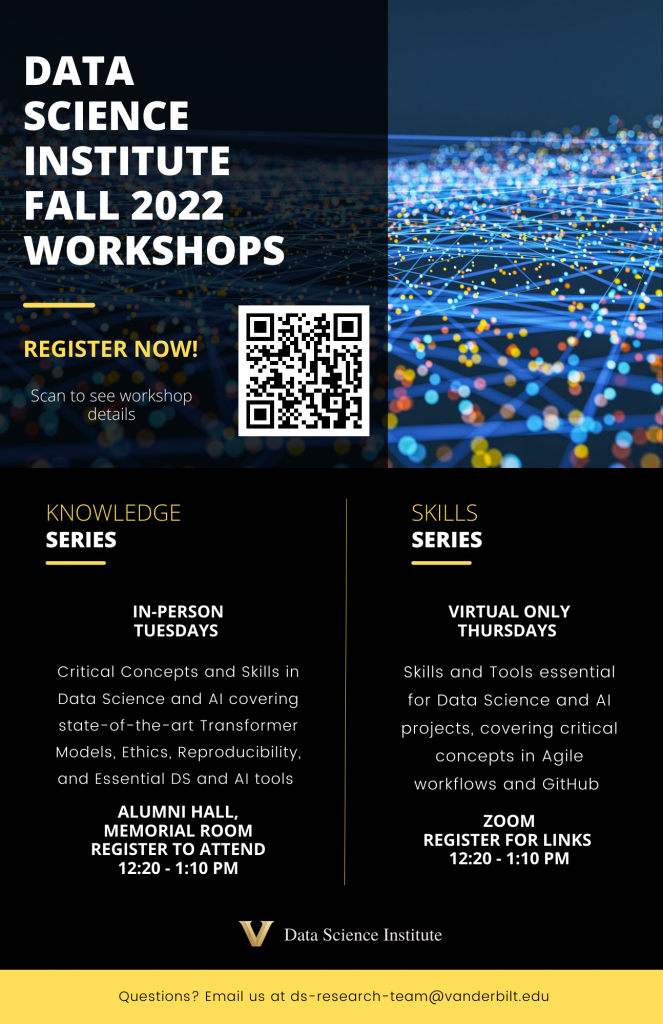
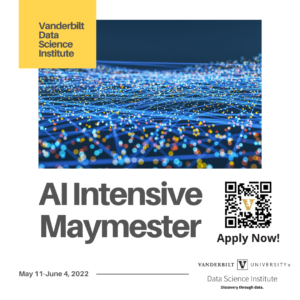
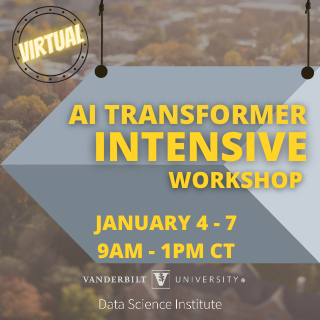 AI Transformer Intensive Workshop
AI Transformer Intensive Workshop